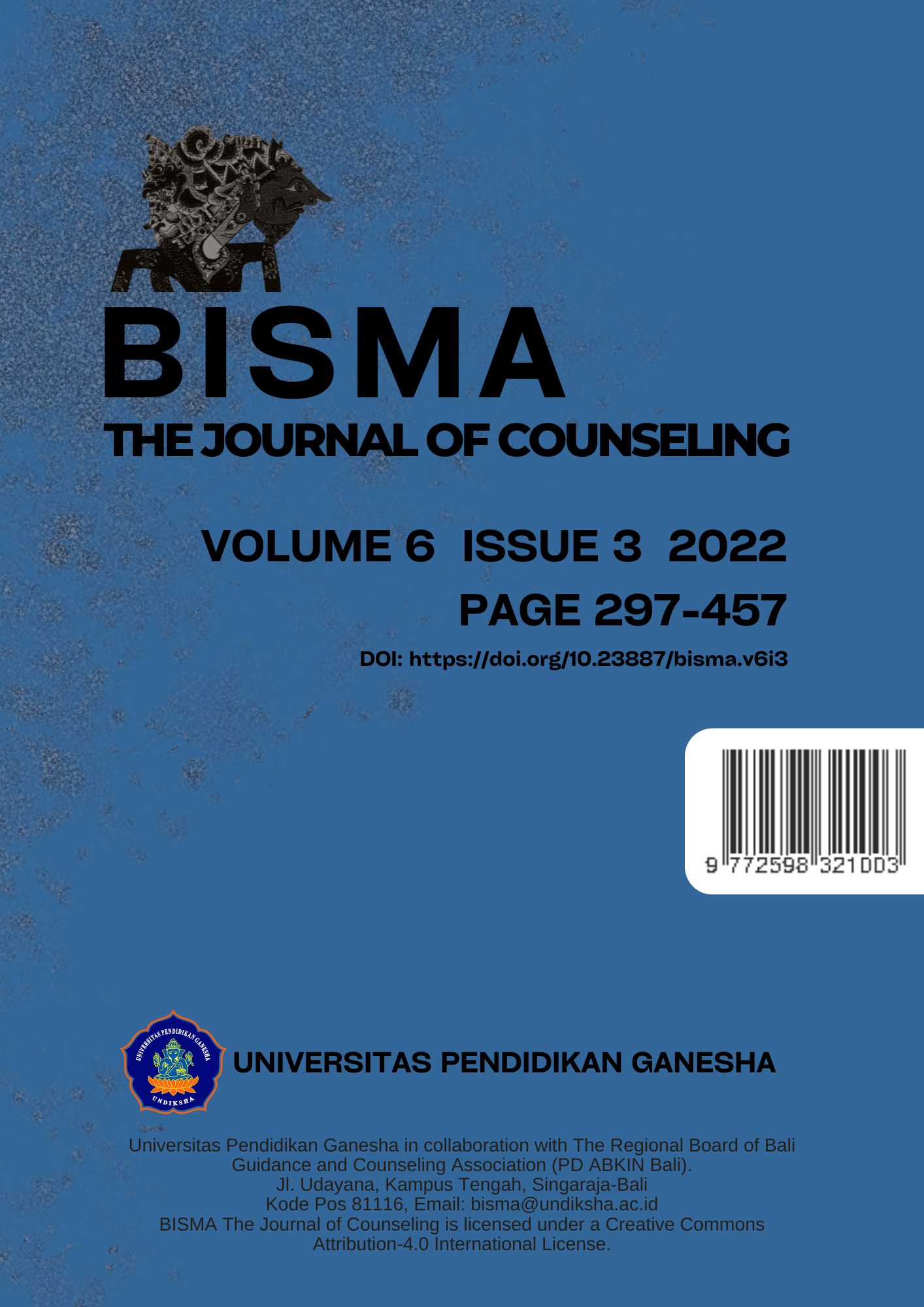The Effect of Behavioral Counseling Implementation with Modeling Techniques in Order to Reduce Students' Aggressive Behavior
DOI:
https://doi.org/10.23887/bisma.v6i3.51070Keywords:
behavioral counseling, modeling, aggressiveAbstract
Experimental research on the effect of implementing behavioral counseling with modeling techniques in order to reduce student aggressive behavior has been widely carried out, but there has been no further study on the results of these studies to be summarized and reassessed so that they can strengthen the results of the research that has been done. This study aims to analyze and describe the effectiveness of the implementation of behavioral counseling with modeling techniques to reduce students' aggressive behavior. This research is library research with the research method used is meta-analysis. The subjects of this research are eleven articles from journals that have been published nationally. Data collection is done by document recording technique. The results of the article analysis by looking for the effect size based on the t-test value so that the effect size result is 2.148, which means it is included in the large category. Factors that influence student aggressive behavior consist of internal factors, namely behavioral patterns, biological factors and frustration, while external factors include poverty, environmental culture, situational, mass media. The results of this analysis strengthen the results of previous studies which state that the implementation of behavioral counseling with modeling techniques has an influence in reducing student aggressive behavior. Therefore this technique is very suitable to be used in order to reduce the aggressive behavior of students.
References
Afni, S. (2018). Efektifitas Konseling Behavioristik Dengan Menggunakan Teknik Modeling Untuk Mengatasi Perilaku Agresi (Studi Exsperimen di Kelas XI IPS 4 SMA Negeri 14 Padang) (Doctoral dissertation, STKIP PGRI SUMATERA BARAT). http://repo.stkip-pgri-sumbar.ac.id/id/eprint/5749
Anjani, N. W. R., Dharsana, I. K., & Dharmayanti, P. A. (2016). Efektivitas Konseling Behavioral Teknik Modeling Dan Teknik Role Playing Untuk Meminimalisir Self Aggression Pada Siswa Kelas X Sma Negeri 1 Sukasada. Jurnal Ilmiah Bimbingan Konseling Undiksha, 4(1). https://doi.org/10.23887/jibk.v4i1.7538
Corey, Gerald, (E. Koeswara. Penerjemah) 1998. Teori Praktik Konseling Dan Psikoterapi. Bandung: PT. Refika Aditama.
Damayanti, R., & Aeni, T. (2016). Efektivitas konseling behavioral dengan teknik modeling untuk mengatasi perilaku agresif pada peserta didik kelas viii b smp negeri 07 bandar lampung. KONSELI: Jurnal Bimbingan dan Konseling (E-Journal), 3(1), 1-10. https://doi.org/10.24042/kons.v3i1.572
Dharsana, I. K., Suarni, N. K., Sudarsana, G. N., Paramartha, W. E., & Ahmad, M. (2020). Cognitive-Behavioral Therapy counseling in developing Cross-Gender Friendship in adolescents. Enfermería Clínica, 30, 206-208. https://doi.org/10.1016/j.enfcli.2019.07.079
Fatimah, E. I. (2019). Konseling Islam dengan teknik Modeling untuk mengurangi perilaku agresif anak Broken Home di Desa Sukowati, Kecamatan Kapas, Bojonegoro (Doctoral dissertation, UIN Sunan Ampel Surabaya). http://digilib.uinsby.ac.id/id/eprint/36677
Gading, I. K., Nisa, U., & Lestari, L. P. S. (2017). Keefektifan konseling behavioral teknik modeling dan konseling analisis transaksional teknik role playing untuk meminimalkan kecenderungan perilaku agresif siswa sekolah menengah atas. Jurnal Kajian Bimbingan Dan Konseling, 2(4), 157-164. http://dx.doi.org/10.17977/um001v2i42017p157
Handayani, M. W., Swistoro, E., & Risdianto, E. (2018). Pengaruh Model Pembelajaran Problem Solving Fisika terhadap Kemampuan Penguasaan Konsep dan Kemampuan Pemecahan Masalah Siswa Kelas X MIPA SMAN 4 Kota Bengkulu. Jurnal Kumparan Fisika, 1(3 Desember), 36-44. https://doi.org/10.33369/jkf.1.3.36-44
Hardiansyah, F., & Adawiyah, S. R. (2016). Efektifitas Bimbingan Kelompok Dengan Teknik Modeling Untuk Mengurangi Perilaku Agresif Verbal Siswa Kelas VIII MTS Al-Hidayah Bekasi. Guidance: Jurnal Bimbingan dan Konseling, 13(02), 10-21.
Permana, M. A., Putri, D. A. W. M., & Suarni, N. K. (2016). Pengaruh Konseling Behavioral Dengan Teknik Shaping Dan Teknik Modeling Terhadap Perilaku Agresif Siswa Kelas VII SMP LAB UNDIKSHA. Jurnal Ilmiah Bimbingan Konseling Undiksha, 6(1). https://doi.org/10.23887/jibk.v6i1.8792
Sukoco, K. W., & Khasanah, R. (2018). Upaya Mengurangi Perilaku Agresif dengan Menggunakan Konseling Behavioral. JCOSE Jurnal Bimbingan dan Konseling, 1(1), 14-18.
Tela, T., Yulian, V. N., & Budianingsih, Y. (2019). Pengaruh Model Pembelajaran Kooperatif Tipe Think Pair Share (Tps) Terhadap Peningkatan Kemampuan Pemecahan Masalah Matematis Siswa. Biormatika : Jurnal Ilmiah Fakultas Keguruan Dan Ilmu Pendidikan. https://doi.org/10.35569/biormatika.v5i01.464
Thalha Alhamid dan Budur Anufia Ekonomi Islam. (2019). Instrumen Pengumpulan Data. Sekolah Tinggi Agama Islam Negeri (STAIN).
Wiladantika, K. P., Dharsana, I. K., & Suranata, K. (2014). Penerapan Konseling Behavioral dengan Teknik Modeling untuk Meminimalisir Perilaku Agresif Siswa Kelas XI Bahasa SMA Negeri 2 Singaraja. Jurnal Ilmiah Bimbingan Konseling Undiksha, 2(1). https://doi.org/10.23887/jibk.v2i1.3717
Pradnyani, A., Gading, I. K., & Dharsana, I. K. (2020). Pengaruh Konseling Behavioral Dengan Teknik Modeling Untuk Meminimalisasi Perilaku Agresif Siswa Kelas XI di SMA Negeri 1 Sukasada. Jurnal Bimbingan dan Konseling Indonesia, 4(2), 87-92. DOI: 10.23887/XXXXXX-XX-0000-00
Yulianto, A. D. (2017). Pengaruh Bimbingan Kelompok dengan Teknik Modeling untuk Mengurangi Perilaku Agresif pada Siswa Kelas VIII SMP Negeri 3 Weru Tahun Pelajaran 2017/2018. Jurnal Ilmiah Konseling, 17(1).
Downloads
Published
Issue
Section
License
Copyright (c) 2022 I Nengah Budi Saputra, Nyoman Dantes, Ni Ketut Suarni

This work is licensed under a Creative Commons Attribution 4.0 International License.








